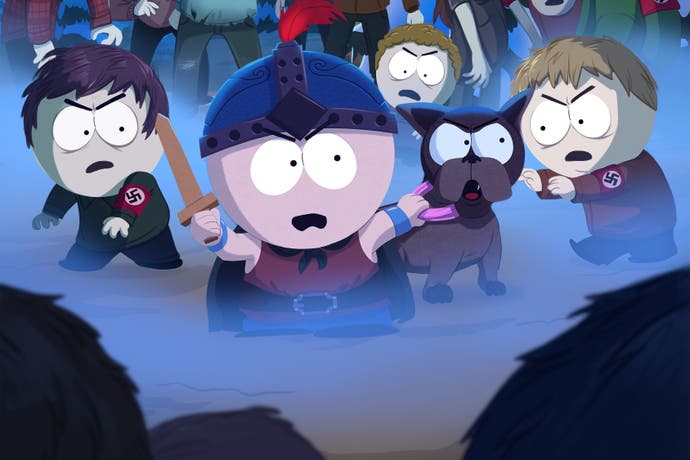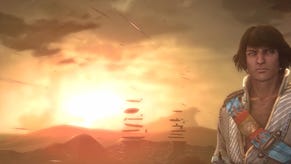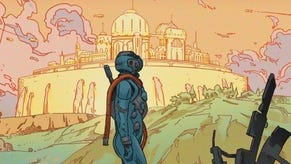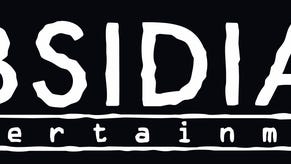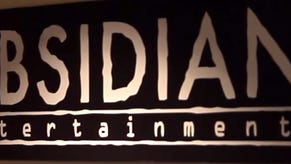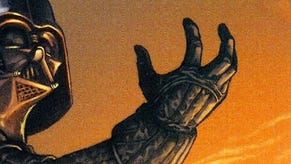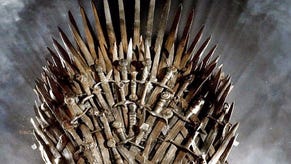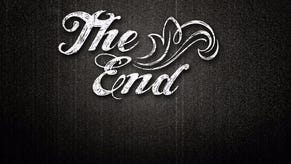South Park: The Stick of Truth review
Anal fantasy farteen.
As the credits roll on South Park: The Stick of Truth, the big question isn't why Ubisoft would choose to censor certain scenes for tender European eyes, but how they censored it. This is a game that doesn't so much cross the line as utterly erase it in a blitzkrieg of piss, poop, farts, profanity and over-the-top violence. In the midst of such gleefully offensive mayhem, working out how far constitutes "too far" is an utterly pointless exercise.
It is, in other words, an absolutely note-perfect adaptation of the legendarily scatological TV show into an interactive form. Previous South Park games have imitated the crass humour and borrowed the catchphrases, but missed the deeper layers of satire and the odd sweetness that binds the foul-mouthed whole together. Characters said familiar things, farts were farted, but the dirty, witty soul was missing.
With creators Trey Parker and Matt Stone fully on board as both writers and voice performers, that certainly isn't an issue with The Stick of Truth. From the script upwards this is a true continuation of the show - an epic spin-off story that could just as easily have been a movie sequel to Bigger, Longer, Uncut. Rather than loosely draping a South Park skin over a generic game, developer Obsidian has created a South Park story that just happens to be a role-playing game.
It's a good role-playing game as well. Not one of the greats, but certainly strong enough to make it one of the better licensed games in recent memory. Obsidian has done a solid job, implementing many of the genre systems you'd expect in a form that won't be off-putting to players drawn to the game by the brand rather than the genre.
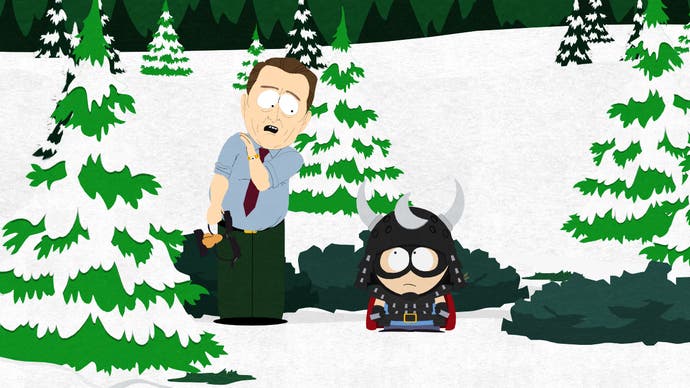
The story starts from a typically mundane place - you're playing a new kid in the neighbourhood who gets roped into Cartman's fantasy war against a rival gang of kids pretending to be Drow Elves - but quickly splinters off into all kinds of ridiculous tangents. Pretty much every South Park character of note gets to appear, sometimes in a cameo, often in a way that is genuinely surprising - and it is, at all times, gut-bustingly hilarious in all the worst ways.
There are four character classes - Fighter, Thief, Mage and Jew - and each has their own suite of special attacks. Weapons and armour start out as childish facsimiles of the real thing, but as the game progresses you'll find yourself equipping the real thing and delivering the sort of spectacular attacks you'd usually find in a Final Fantasy title.
Magic is replaced with four fart attacks, which can stun, distract or gross out enemies. Grossed Out is also one of a few uniquely South Park status effects, leaving characters losing health and vomiting every turn. Pissed Off is another, enraging an enemy and directing their attacks to a single foe. You can also combine your farts with normal melee and ranged attacks, using your bum gas to deliver rising strikes or jet-propelled guffs.
The loot system isn't particularly deep and you won't go far wrong if you make sure to equip whatever the most powerful weapon is for your current level. Armour can offer additional perks by applying patches, while weapons can similarly gain extra bonuses by equipping add-ons - or strap-ons, to use the South Park-approved name. These are found in chests, bags, drawers and cupboards that litter the town's small but intricate map. The more characters you befriend around town, the more perks you can also add to your character.
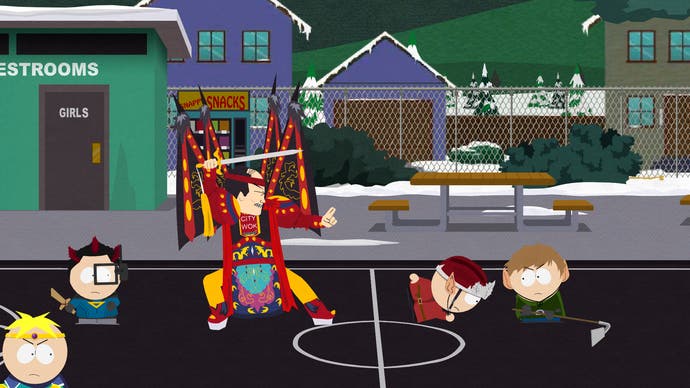
It's impressively fully featured for a game that could have got away with a lot less, yet there are areas where you can sense a larger, more involved game chafing at the limitations Obsidian has opted to work within. For example, your party only ever consists of you and one "buddy" companion, unlocked from the show's cast as you progress. You can swap them out at any time - even during combat - but you have no input over how they develop or what weapons or armour they use. They'll earn the occasional new ability in parallel to your own levelling up, but they're frustratingly out of your reach in terms of customisation.
Buddy characters are sporadically useful outside of combat. You can direct Butters to heal characters who will then help you, while Kenny (dressed, in this game, as a princess) will reveal his nipples to entice enemy characters. Mostly, however, they're there to deliver additional special attacks in the game's many fights.
These, sadly, are the weakest parts of the game. Battles are turn-based, but in what is perhaps a nod to the Mario RPGs, both attacks and blocks are based on timed button presses and QTE-style inputs. Fail to tap at the right time and you'll fail to do any damage, or will take damage of your own. In fact, one way or another, you're going to take damage because blocks don't actually save you from losing health. It's frustrating to get a "PERFECT" screen flash even as hundred of points are shaved off your health bar. With some very fussy inputs and often elusive rhythms, it can take a while to warm to this slightly fidgety style of fighting.
Despite this, the game is phenomenally easy. Unless you avoid the inventory screen altogether and ignore the unwritten RPG rule of looting everything you can, it's hard not to be ahead of the curve when it comes to dishing out damage and soaking it up. You'll also rarely be without a groaning stash of potions, since they're found everywhere, and should you run low the game also provides a constant drip feed of junk items that can be sold to earn cash to buy whatever you're missing.
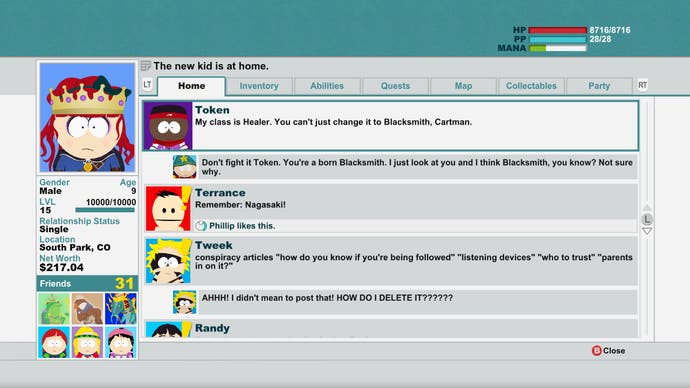
As a result, you tend to glide through combat by guzzling potions to compensate for the lumpen blocking mechanic, and even when you get to more challenging boss encounters where enemy healing and shielding threatens to become an issue, you can almost always progress through sheer gluttony and overkill rather than by having to think too deeply about what sort of combat approach to take. To put it in perspective, throughout the whole game I only failed in combat four times.
"Quite why Ubisoft felt it had to remove seven scenes along the way is a mystery... it's certainly not a game where the concept of 'holding back' seems to have any meaning."
This really is a game that's about the journey, however, and quite why Ubisoft felt it had to remove seven scenes along the way is a mystery we may never solve. What we get in their place are witheringly sarcastic text screens, clearly written by an exasperated Parker and Stone, explaining what we're missing. In a weird way, these may actually be funnier than the scenes themselves - I've spoken to more than one person who thought they were part of the joke - but it still feels like a weird choice. This is a game where you'll fight Nazi zombie aborted foetuses and spend an entire gameplay section ascending a debris-filled rectum. It's definitely the only game I've ever played where I've had to dodge a giant swinging pair of testicles (the context of which actually makes it worse) and therefore it's certainly not a game where the concept of "holding back" seems to have any meaning.
Provided you're not so incensed as to boycott the game on general principle for Ubisoft's censorious snips, what we do get should be plenty for everyone. And, as with all the best South Park material, it's never just about the filthy stuff. There are hundreds of brilliant little side gags, hilarious visual puns and oddball tangents. There are spot-on parodies of Ralph Bakshi's 1970s rotoscoped fantasy animations, chintzy makeover apps, a mind-boggling anime spoof that is perfect down to the last detail and even an extended segment in which the game turns into a Zelda-esque 16-bit tribute. The script doesn't get too bogged down in trying to poke fun at games in particular, but when it does decide to take aim at the worst clichés - pointless audio diaries, Nazi zombie enemies - it does so with surgical precision.
It all adds up to a game that is a constant source of grubby pleasure for the duration of its story mode. The show's 2D world is recreated superbly - how could it not be? - and only occasionally does the retro-flavoured flip-screen construction of the town lead to muddled navigation. It's sometimes easy to miss important objects or exits because of the game's limited visual palette, but nothing that will leave you cursing for long.
The game's only other weakness, after the fussy combat, is that it feels very much like a one-and-done experience. What side missions there are take the form of easily completed fetch quests, and attentive players will find that by the time they finish the story there's not a whole lot left to do beyond mopping up a few collectables.
That's compounded by a general absence of the replay value you'd expect from an RPG. There's only one point in the story where you can briefly alter the narrative flow by choosing between two factions, and opting for a different character class leads to different special moves but not much else in terms of gameplay changes. It's not a game where a mage play-through will be any different to one as a thief. The starting gear is limited by class, but it's open season on everything else in the game. Regardless of who you choose to play as, you'll have access to the same swords, bows and farts by the time you call time on a second play-through.
A finicky combat system, a lack of challenge and few reasons to remain in South Park once the story is done - these minor disappointments hold The Stick of Truth back from greatness, but they don't detract from the sheer audacious hilarity it delivers. In gameplay terms it may be soon forgotten, but there's unlikely to be a funnier - or filthier - game any time soon.
